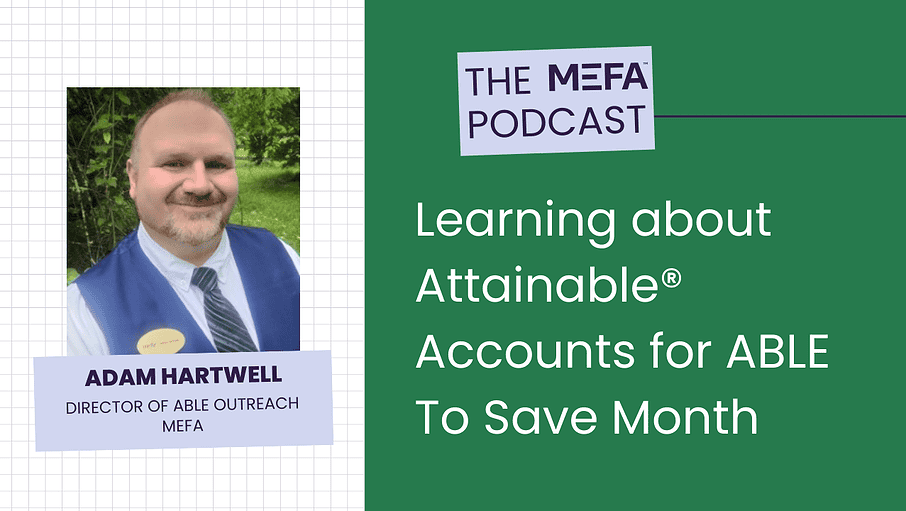Resources Mentioned in this Episode
Adam Hartwell: [00:00:00] I would say there is generally no negative to having the account. This, these accounts are not silver bullets. They don’t solve every problem that exists. But having a way to save money is always a good. Being able to have it in a tax advantaged account that has growth because it’s an investment is even better.
Jonathan Hughes: Hello everyone and welcome to the MEFA Podcast. My name is Jonathan Hughes.
Julie Shields-Rutyna: And I’m Julie Shields-Rutyna.
Jonathan Hughes: And August is Able2Save month and today we have on the MEFA Podcast for a return engagement MEFA’s Director of Able Outreach Adam Hartwell. He’s going to talk to us about eligibility and saving for long and short term expenses, as well as some other things ABLE related. But first, Julie, what do you [00:01:00] say to a mailbag question?
Julie Shields-Rutyna: Oh, I am always happy to entertain a mailbag question.
Jonathan Hughes: All right. Just as a reminder to everybody, these are questions that have come in to us over the past weeks and have been answered by our college planning team. If you have any questions You can email us at [email protected] or you can call us at 800 449 MEFA. Or, you can also reach us over social media on Facebook, that’s @MEFAMA, on X, it’s @MEFATweets, and on Instagram, it is @MEFA_MA. Now today, our question comes to us from Trevor, who writes, I received confirmation that I was approved for a loan. How long does this usually take to process with my school?
I know this is the time of year where people are waiting on disbursements, Julie. I don’t know if you wanted to just go over what happens after you get approved for a loan and how long That would take to get to a school.
Julie Shields-Rutyna: Yes. [00:02:00] Congratulations. That’s good. A little bit of a relief when you get that approval. So the way that would work at MEFA is you would receive the approval and then the information gets sent to your college and what your college does is they certify, they need to certify the loan and what that means is they need to double check what you want to borrow. Against the fact that you’re going to be a student and that You are taking enough credits, to qualify that way, and that your costs warrant you taking the amount that you’re applying for.
So they go through a little calculation, and then they say, yes, Trevor can borrow that loan, and they will pay you. Certify it in the system, and so then the combination of MEFA’s approval and the certification by your institution is enough to make the loan, then be processed. And then usually when that happens the loan can be disbursed [00:03:00] the following Friday and the money will go to your school.
So let’s just talk a little bit about time of year. So at this time of year, John alluded to, at this time of year is August 12th, we’re talking about is, It’s busy, right? So colleges are really going through and certifying a lot of loans at this time, so that can be good and bad in a way. That means they have staff members doing that all day long every day.
Sometimes that will go through pretty quickly with the certification, but it also means they have a lot of loans that. Could mean it could slow things down for a day or two. So if you find yourself bumping up against a deadline or something, you can feel free to give the college a call and just say you have a loan in process. Is that fine? Do I not have to pay my bill because I know that loan will be coming, something like that. I’ll make one more note, which is that I’ve experienced that once in a while, if a family applies for a loan, that sort of, off the two main times, at this time of year and [00:04:00] late December into January, when a lot of spring bills are being paid.
If you apply for a loan in an off time and it seems to be taking a little time, you might also want to nudge the college because that might mean they’re not as used to going in every hour or every day to certify loans and just make sure they know your loan is coming through.
Jonathan Hughes: All right. Thanks, Julie. One more time, if you have any questions, you can email us at [email protected]. You can call us at 800 449 MEFA. Our Facebook is @MEFAMA, X @MEFATweets and Instagram is @MEFA_MA. Just remember, we have a bench of college guidance experts waiting to answer your question.
But now, let’s shift gears and welcome on to our show, our guest. As I mentioned, August is National ABLE to Save Month, and here to discuss ABLE eligibility as well as short term and long term use and more [00:05:00] is MEFA’s Director of ABLE Outreach. Welcome back to the show, Adam Hartwell. Hello, Adam.
Adam Hartwell: Hello there, Jon. Thank you so much for having me.
Jonathan Hughes: Oh, no, it’s my pleasure. Before we get into it, just if people need a reminder, can you briefly describe the Attainable and Able programs?
Adam Hartwell: ABLE is the Stephen Beck Jr. Achieving a Better Life Experience Act, which was signed into law in 2014 by President Obama at the time.
It was a change to the IRS Code. A lot of people are very familiar with 529 College Savings Plans. This is 529A and has a lot of things in common with it. 529 is saving for qualified educational expenses. 529 is an investment account that saves for qualified disability expenses. This allows you to not only save money in general on these tax advantaged investment accounts, but perhaps more importantly, money in an ABLE account [00:06:00] does not affect federal public benefits. And for a lot of states, Massachusetts being one of them a lot of times when we’re talking about the state benefits, they follow the lead of the federal benefits as well. So sometimes it won’t affect state benefits as well, but that’s not always the case. Each state that has an active ABLE program, Is allowed to put their own rules in place except for some, more macroscopic ones that everybody has to follow, but there are some details that they get to change.
So each state gets to have their own program and name it their own way and what have you. So here in Massachusetts, we have the attainable account. It was very cleverly named. You got to attain able. And so that is the Massachusetts version of able.
Julie Shields-Rutyna: Great. And can you talk a little bit about eligibility? So who is eligible to open an ABLE account?
Adam Hartwell: Sure. People are eligible for an attainable account. If the onset of disability occurred before the individual turned 26 years old currently, I know we’re going to go into that a little bit more later. They should [00:07:00] be eligible to receive SSI or SSDI due to their disability, or if they’re not receiving SSI or SSDI, they can self certify as meeting requirements.
Generally Things with functional limitations to your day to day experience. Good guidelines are things like the social security administration’s blue book or their compassionate allowances conditions.
Jonathan Hughes: And I understand that there is a big change coming up in terms of eligibility for able, and can you talk about that? What’s the, I know there’s a slogan. What’s the slogan and what does it mean and what. Will that have on the program?
Adam Hartwell: So the slogan is 26 to 46 and 26. I do not like the slogan very much because I feel like you need to have a full understanding of everything surrounding it in order for it to make sense.
What it is indicating is that on January 1 of 2026, we are changing the eligibility guidelines to the what is it the able age Adjustment Act. That was an Able Age Adjustment Act. I can get [00:08:00] it. And what that is changing it from you can have to have received your be able to provide a doctor’s notice on the saying I’ve had this disability since before age 26 to I’ve had this disability before age 46.
This is a major change. It also opens this program up to a lot of people who receive diagnosis later in life who might receive have been in. A traumatic car accident or something that has created circumstances where they’ve become disabled for the vast majority of people. Nobody is always able. We are temporarily able until we become disabled, over the course of life, we either have injury aging we lose our eyesight.
We lose our hearing. The systems that we can put into place then the more that we can expand them to make them accessible to individuals, the greater benefit in general to the community as a whole.
Julie Shields-Rutyna: And I know, Adam, you and I talk about this often, can you talk a little bit in detail, really, about the types of disabilities that are [00:09:00] qualifying disabilities, and I know you’ve educated me on some that might not be at the forefront of my mind, thinking about a wide range of different individuals.
Adam Hartwell: I absolutely the litmus stuff, once again, is largely about functional limitation. And the easiest way to look at functional limitations generally with employment is a person able to hold down a full time job. That is one of the easiest ways to consider it. So it’s not, and it’s not about whether or not I can hold down a full time job for one week.
It’s, can I hold down a full time job for the duration of a career? So if I have a condition that has flare ups, that’s takes me out of being able to work for two weeks out of every four months. That is something that will probably prevent me from a lot of companies. that I’m able to hold that job.
So a lot of people who are highly educated, highly capable would qualify for these programs because they would have those functional limitations. So these extend also to a lot of things where we might have something that has happened in life, which creates an extended need of disability [00:10:00] service. For instance, long term cancer recovery.
We also have very capable individuals who have experiences that impact their ability to interact with the general public. For instance, if you are someone with complex PTSD from being in military service, and that has created in you a, there are times where you’re having really bad mental health days, and you need to be able to take yourself aside and be able to protect your well being.
All of those things, musculoskeletal conditions, Cornelia de Lange syndrome, cerebral palsy endocrine system things where you need regular medical treatment in order to maintain yourself, all those conditions would apply to someone being able to be qualified for an ABLE account.
Jonathan Hughes: Can we do the same thing but for eligible expenses? So there are categories of eligible expenses, so things that you can use the attainable Funds for and not be subject to taxes. Can we go over those a little bit and then talk about some that [00:11:00] maybe some people aren’t thinking of?
Adam Hartwell: Certainly. So we have what we call qualified disability expenses. There were a, range of categories that were put into the initial outline of how the system was going to go put forward by the IRS. Those guidelines have been sanctioned as this is what we’re utilizing until you receive greater clarification. So those guidelines have came out many years ago when this was being set up, and it was understood that those actually are the rules that we follow until we’ve received clarification, and we did do that for a couple of the categories.
The general categories of those are education, housing, transportation, employment training and support, assistive technology and related services, health. Prevention and Wellness, Funeral and Burial Expenses, Basic Living Expenses, and Personal Support Services including Financial Management, Administrative Services, Legal Fees, and Expenses for Able Account Oversight.
One of the big clarifications that we got actually on that basic living [00:12:00] expenses is food. All food. At this point is a qualified disability expense, whether that is going out to eat or staying indeed. So all your groceries or something you can use your able account for, but also go into your local McDonald’s or if you have, once again, a functional limitation that’s keeping you from being able to go.
Somewhere to get food. And you’re also, once again, you’re having trouble with your grip or something. You feel like it’s unsafe for you to cook. That’s the reason that we also like Uber Eats, DoorDash. Those are all qualified expenses. However, you’re getting food to you, qualified disability expense.
Julie Shields-Rutyna: Now I know when this program was set up, it was set up so that it could be used for long term expenses or short term expenses, and now that it’s been available and.
people have been using it. I think we’ve learned a lot about how people are using their accounts. So can you talk a little bit about all the ways that people are using ABLE accounts?
Adam Hartwell: There’s a wonderful diversity in that. As you said, because we have some folk who are using it [00:13:00] for short term use, and there’s people who are using it for long term use because it’s an investment account.
There is a return on it. There’s not interest on these accounts, but there is a return. So those accounts actually do provide some excellent benefits for long term savings for a lot of folk. That is a game changer as far as what they’ve been allowed to do. We think about financial limitations and what we need to be able to afford.
And there’s things that are, simple expenses that might be one time you do it every once in a while, but there’s also things that need to be continually maintained. So I might use my, the investment savings side of it to do things like saving for a significant surgery because I need to move close to a specialist because I would like to pursue higher education and I need to do it in a much more, Expanded slower format.
I need to do only a couple of credits at a time due to whatever challenges that I might have that might prevent me from being able to take five classes at once. [00:14:00] So all those things are great ways to utilize an attainable account. Likewise, you could be using it. Okay. I can do five classes at once, but I need Assistive technology in order to be successful.
I can buy the assistive technology, or even if I have say something like an iPad and I need the applications to run on it in order to assist me with communication to, with note taking, what have you, those are also things you could buy. You can pay for your housing expenses, including your rent and your first last security, your garbage, your water, your electricity.
Under SSI guidelines, you’re allowed to have one automobile without it affecting your benefits, but the automobile that most people are able to get when you’re not allowed to have much in the way of resources is usually one that, dies very quickly and then you can’t replace it. So this is another place where you can save or maintain utilizing your attainable account.
So this is a wonderful diversity of just general life enhancement that can come from having the opportunity to have [00:15:00] A viable place to put funds that don’t threaten the things that you want to do in your life.
Jonathan Hughes: What reasons have you heard from people about why they have not opened an ABLE account?
Adam Hartwell: The biggest one is that there is a generalized fear that has existed since prior to ABLE existing about losing benefits. For a lot of folk who are trying to make their life better. Functional, be able to move forward to progress the benefits that they receive are very necessary to their survival and being concerned about, okay, I can’t work too many hours. If I do, I’m going to lose my benefits. I’m going if, if I.
If you give me that car, it might be counted as an asset. I’m going to lose my benefits. My grandmother died and left me 5,000, not 5 million, but even 3,000, that’s going to blow out my asset limit because the asset limit [00:16:00] for. SSI is 2,000. I’m now going to be in a state where I’m going to maybe lose my housing waiver because I have too much money in the bank, even if it’s not very much in the long run.
So that fear has existed for a very long time. So the idea that this, Program exists now that can perhaps assist with that. There is a lot of caution that a lot of people have going into it that, Oh, what is that real? Is that actually going to work the way it’s supposed to work? We’ve had a phenomenal response from the community as people are utilizing these accounts in that they do work in this way.
They can be utilized by parents. They can be utilized by guardians. They can be utilized by rep payees to assist an individual who might not be able to control their finances themselves. And they can also, of course, be utilized by individuals themselves, by far in the vast majority. Individuals with disabilities who would like an opportunity to be able to expand their horizons, to be able to say, I want to save money so that I can stop maybe using [00:17:00] benefits in order to be able to progress my life.
Or I just need, I can end up using less help. Because I’m allowed to save for when emergencies occur, instead of having to go into major debt when emergencies occur. These kinds of mitigating factors to a person’s day to day life are one of the great pros of this program. But the fear that has existed before it existed absolutely does permeate.
The other big one that we do certainly see is that part of the able program is that there is a Medicaid repayment program built into it. This is actually also true for a lot of special needs trusts where there is a level of reimbursement that States that you have lived in are allowed to say, okay, we gave you essentially free health insurance.
We would like you to pay us back for on some level of that. Now we have not had these accounts in existence long enough to see how aggressive the Medicaid is going to be about that. But we have generally seen that, especially because after a person passes where this is, [00:18:00] which is the occasion where that would happen because you’re allowed to pay all qualified disability expenses that still exist before anything happens.
So including all your funeral burial expenses and your hospital bills that. Frankly, there’s not a lot of money that they can try to take back from you after all that is done in the first place. With those things in mind, I feel like the fear, while I fully understand why it exists, I truly do advocate that this program, I think, is not something that should contribute to it.
Julie Shields-Rutyna: And Adam, just along those lines, can you just remind everyone what are the high savings limits, which great are much greater than it used to be?
Adam Hartwell: Absolutely. This is one of those things that actually does change on a state by state basis. So if our listeners are all over, you can certainly always open an account in any state that you choose.
So if you’re out of state and you want to open in Massachusetts, you’re very welcome. But here in Massachusetts, the cap that you’re allowed to save in an [00:19:00] ABLE account is 500,000. However and that’s one of the, some states it’s 200,000. Your SSI, however, will be affected no matter what state you live in once you hit 100,000 in your account.
So you’re allowed to save up to 100,000 before it starts affecting your benefits, which is far better than the 2,000 plus 65 in disregards that you were allowed to do prior to this program existing.
Jonathan Hughes: One more thing is since we do offer the 529 plan as well, I’ve heard that you can roll a 529 plan in our case, the Massachusetts U Fund but you can roll that into a 529 A. Can you tell me about that?
Adam Hartwell: There is a program currently existing where you can roll from your 529 into your 529 a without any fees or challenges or what have you. You’re only allowed to do that to the, whatever the current maximum contribution is. For the able account is in your [00:20:00] state. In Massachusetts currently in 2024, cause one of the great things is this has expanded almost every year.
This program has been in existence. It is 18,000. If the person is not working, if an individual with a disability who has the account is working, then you can add on top of that, the lesser of their earnings versus the federal poverty guideline, which is currently 14,580. So the person can do if they’re not working they can do the 18,000 if they’re working and they’re earning 10,000 a year, then they can do 18,000 plus 10.
That’s what they can roll over. They can put into the account as a general contribution regardless. So then that, and what essentially the rollover is counted as a contribution. So if you’re working and you’re in 16,000 a year or 20,000 a year, you can do this full 14,580. So that means 32,580 per year is able to be put into your 529A, your ABLE account.
Now, that program is due to [00:21:00] sunset currently. On January 1 of 2026. So you only have two more contribution limits that you can roll into it at the moment. Legislation currently exists that they’re trying to pass through to extend that program.
Jonathan Hughes: If you have any parting thoughts before we go to anybody who is maybe listening to this and intrigued by what they hear and they’re maybe want to step back.
Forward and open an account, but are maybe hesitant. What would you say to that person?
Adam Hartwell: I would say there is generally no negative to having the account. This, these accounts are not silver bullets. They don’t solve every problem that exists, but having a way to save money. Is always a good being able to have it in a tax advantaged account that has growth because it’s an investment is even better.
And the one thing about these accounts is that they are good, no matter the circumstance of the individual who is opening one. If you are in [00:22:00] a residential program who is really struggling with the SSI limits, particularly if, due to staffing changes or whatever, there’s, they’re not having the opportunity to go do outings or be able to Participate in their community as much as they once were, particularly post covid that we’re having, we’re seeing a lot more need for what are called spend downs where people have too much money and you need to spend your money so that they get back under their limits.
This having this open instead of having to spend the money on something you don’t need. Because it literally has to be something somewhat useless by the rules, because it cannot be something that can be counted as an asset. And it also cannot be something that can benefit the household because then it’s not a personal expense.
So if you have five people living in a house, you can’t buy a new television for you and all your roommates. That would that breaks the rules. It has to be just for something that’s, in your bedroom. So I get, these, there’s all these rules on the things that force people to spend money in ways that they don’t need to.
With this program in existence. Additionally, it can provide a pathway for [00:23:00] someone who thinks they might be able to be a full time employee who’s never had that chance before. Because they can save up money as a buffer, as a safety net in their attainable account to take that risk. You can save up money for educational.
I want to expand my, my, what I believe I’m going to be able to accomplish. I can save up. I’m a person with a disability. I want to receive professional training so that I can, because I found what I’m passionate about. There are so many different areas in life where just having this opportunity for this non recreational spending and then there is that limitation on it because you can’t really use it for a vacation or what have you.
But if you can even just think of all the different areas where I just need to save to be able to pay my bills, because I’m Often running up against the limit because I’m only allowed to have this much money. It can be beneficial. So I think it is a. It’s great to have an, it’s an additional room on the house.
It’s a space where we can put things until we need them as opposed to having to throw them out. And I think it’s a great thing.
Jonathan Hughes: All right. Thank you so [00:24:00] much, Adam.
Adam Hartwell: Thank you so much. I’m proud to be here and it’s great to see you, Julie. Thank you as well.
Jonathan Hughes: That’s our show. Thanks again to Adam. Thank you, Julie, for being here. And if you liked what you heard today and you want to hear more from us on planning, saving, and paying for college and career readiness, as well as other expenses, as we’ve heard, then you can follow the show and please do that.
You can find us wherever you find your podcasts. And please remember to review us. It helps us keep doing what we’re doing. This show out to folks like you, I’d like to thank our producer, Shaun Connolly. I’d like to thank AJ Yee, Lisa Rooney, Lauren Danz, and Meredith Clement for their assistance in getting the show posted.
Once again, my name is Jonathan Hughes, and this has been the MEFA podcast. [00:25:00] Thanks.













